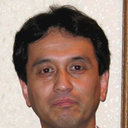Successful cochlear implantation in a patient with bilateral progressive sensorineural hearing loss after traumatic subarachnoid hemorrhage and brain contusion.
Palavras-chave
Resumo
OBJECTIVE
We address the proper indications for cochlear implantation for profound deafness with possible retrocochlear involvement by reporting successful implantation in a patient with traumatic subarachnoid hemorrhage and brain contusion.
METHODS
We present a patient (55-year-old man) who had bilateral progressive sensorineural hearing loss after traumatic subarachnoid hemorrhage and brain contusion. Preoperative imaging and functional studies were done, as well as routine tests, to evaluate the possible performance of the cochlear implant.
RESULTS
Sensorineural hearing loss developed promptly after head trauma with progressive deterioration. The cause of progressive sensorineural hearing loss remained unknown. Distortion product otoacoustic emissions demonstrated bilateral inner ear (outer hair cell) damage. Highly impaired speech discrimination despite less marked pure tone average elevation and a focal lesion in the left middle temporal gyrus suggested the possibility of coexisting retrocochlear lesions. After thorough discussion of the possible outcomes, cochlear implantation was successfully performed 25 months after the trauma. The patient became able to use a telephone.
CONCLUSIONS
We advocate that profound bilateral sensorineural hearing loss caused by traumatic head injury, even with possible involvement of central auditory pathways, should not be regarded as a contraindication to cochlear implantation, as long as bilateral inner ear dysfunction is clearly demonstrated and there is no obvious evidence of central deafness.


